-
 Bitcoin
Bitcoin $82,770.9885
-0.53% -
 Ethereum
Ethereum $1,811.0838
-0.62% -
 Tether USDt
Tether USDt $0.9996
-0.01% -
 XRP
XRP $2.0610
1.56% -
 BNB
BNB $591.5998
-0.12% -
 USDC
USDC $0.9999
0.00% -
 Solana
Solana $116.7637
-3.59% -
 Dogecoin
Dogecoin $0.1606
-2.58% -
 Cardano
Cardano $0.6491
0.00% -
 TRON
TRON $0.2375
1.32% -
 Toncoin
Toncoin $3.6204
-7.56% -
 UNUS SED LEO
UNUS SED LEO $9.4063
0.23% -
 Chainlink
Chainlink $12.8000
-2.19% -
 Stellar
Stellar $0.2605
1.01% -
 Avalanche
Avalanche $18.1124
-1.26% -
 Sui
Sui $2.2384
-2.51% -
 Shiba Inu
Shiba Inu $0.0...01223
0.65% -
 Hedera
Hedera $0.1627
0.30% -
 Polkadot
Polkadot $4.0538
1.44% -
 Litecoin
Litecoin $82.9722
0.02% -
 MANTRA
MANTRA $6.4051
3.36% -
 Bitcoin Cash
Bitcoin Cash $301.6530
1.88% -
 Bitget Token
Bitget Token $4.4826
-1.05% -
 Dai
Dai $1.0000
0.02% -
 Ethena USDe
Ethena USDe $0.9995
-0.02% -
 Monero
Monero $212.5474
-1.93% -
 Hyperliquid
Hyperliquid $11.6624
-5.49% -
 Pi
Pi $0.5680
-13.45% -
 Uniswap
Uniswap $5.8333
-1.59% -
 Aptos
Aptos $5.0533
-1.32%
Can blockchain technology be applied to non-financial fields? Give an example?
Blockchain's potential extends beyond finance, offering secure, transparent solutions in supply chain, healthcare, voting, and digital identity management.
Mar 27, 2025 at 12:21 am
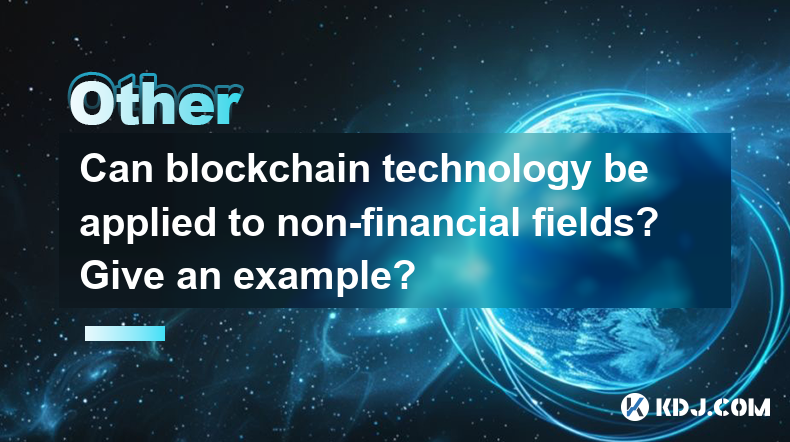
Blockchain technology, initially conceived for cryptocurrencies like Bitcoin, possesses capabilities far exceeding simple financial transactions. Its inherent security, transparency, and immutability make it a compelling solution for a wide array of non-financial applications. This article explores the potential of blockchain beyond finance and provides concrete examples.
Beyond the Ledger: Exploring Non-Financial Blockchain Applications
The decentralized and transparent nature of blockchain offers significant advantages in various sectors. Its ability to record and verify information securely without a central authority makes it ideal for applications requiring trust and accountability. This contrasts sharply with traditional centralized systems vulnerable to single points of failure and manipulation.
One crucial aspect is data integrity. Blockchain's cryptographic hashing ensures that any alteration to the data is immediately detectable. This feature is particularly valuable in sectors where data authenticity is paramount, such as supply chain management and healthcare.
Supply Chain Management: Tracking Goods from Origin to Consumer
A prime example of blockchain's non-financial application lies in supply chain management. Traditional supply chains often lack transparency, making it difficult to track goods and verify their authenticity. This can lead to counterfeiting, inefficient processes, and difficulties in recalling faulty products.
- Enhanced Traceability: Blockchain allows for the creation of a permanent and immutable record of a product's journey, from its origin to the consumer. Each stage of the supply chain, including manufacturing, transportation, and distribution, can be recorded on the blockchain.
- Improved Transparency: All stakeholders involved in the supply chain can access the blockchain and view the product's history, enhancing transparency and accountability.
- Reduced Counterfeiting: The immutability of the blockchain makes it extremely difficult to counterfeit products, as any attempt to alter the record would be immediately detected.
- Streamlined Processes: Automating processes through smart contracts on the blockchain can significantly improve efficiency and reduce costs.
For instance, a luxury goods manufacturer can use blockchain to track the entire lifecycle of its products, ensuring authenticity and preventing counterfeiting. Consumers can scan a product's unique identifier to verify its authenticity and trace its origin.
Healthcare: Securing and Sharing Medical Records
The healthcare industry is another sector that can greatly benefit from blockchain technology. Current systems for managing medical records often suffer from issues of data security, privacy, and interoperability.
- Improved Data Security: Blockchain's decentralized nature enhances data security by eliminating single points of failure. Medical records are encrypted and distributed across multiple nodes, making them more resistant to hacking and data breaches.
- Enhanced Privacy: Patients can control access to their medical records, granting permission to specific healthcare providers or researchers. This ensures patient privacy and compliance with data protection regulations.
- Increased Interoperability: Blockchain can facilitate seamless data exchange between different healthcare providers and institutions, improving the efficiency of care.
- Streamlined Clinical Trials: Blockchain can be used to securely manage and track data from clinical trials, ensuring data integrity and reducing the risk of fraud.
Imagine a system where patients have complete control over their medical data, securely sharing it with their doctors and other healthcare providers as needed. This eliminates the risk of data loss or unauthorized access.
Voting Systems: Ensuring Transparency and Security
Blockchain's potential extends to democratic processes, offering a secure and transparent way to conduct elections. Traditional voting systems are susceptible to fraud and manipulation, raising concerns about the integrity of election results.
- Enhanced Security: Blockchain's cryptographic security makes it virtually impossible to tamper with votes, ensuring the integrity of the election process.
- Increased Transparency: All votes are recorded on the blockchain, allowing for public verification of the results. This enhances trust and accountability.
- Improved Efficiency: Blockchain can automate the vote counting process, reducing the time and resources required for manual counting.
- Reduced Fraud: The immutability of the blockchain makes it extremely difficult to commit voter fraud, such as double voting or ballot stuffing.
A blockchain-based voting system could significantly improve the transparency and security of elections, boosting public confidence in the electoral process. This is especially crucial in regions where election integrity is a major concern.
Digital Identity Management: Secure and Portable Identities
Blockchain can revolutionize digital identity management by providing a secure and portable way to manage personal information. Current identity systems are often fragmented and insecure, making it difficult to verify identity online.
- Enhanced Security: Blockchain's cryptographic security protects personal information from unauthorized access and theft.
- Improved Privacy: Users have greater control over their personal data, deciding what information to share and with whom.
- Increased Efficiency: Blockchain can streamline the process of verifying identity online, reducing the time and effort required for authentication.
- Improved Interoperability: Blockchain can facilitate seamless data exchange between different organizations, improving the efficiency of identity management.
This system could be used for various applications, from online banking to accessing government services, providing a secure and convenient way to manage digital identities.
Frequently Asked Questions
Q: What are the limitations of using blockchain in non-financial fields?
A: While blockchain offers many advantages, scalability, regulatory hurdles, and the complexity of implementation remain challenges in non-financial applications. The energy consumption of some blockchain networks is also a significant concern.
Q: Is blockchain technology suitable for all non-financial applications?
A: No, blockchain is not a one-size-fits-all solution. Its suitability depends on the specific requirements of the application, including data volume, security needs, and regulatory compliance.
Q: How can I learn more about blockchain applications beyond finance?
A: Numerous online resources, including research papers, white papers, and industry publications, provide detailed information on blockchain applications in various sectors. Attending industry conferences and workshops can also be beneficial.
Q: What are the potential future developments in non-financial blockchain applications?
A: Future developments may include the use of more efficient consensus mechanisms, the integration of blockchain with other technologies like AI and IoT, and the development of new blockchain platforms specifically designed for non-financial applications. The exploration of privacy-enhancing technologies within blockchain architectures is also a key area of ongoing development.
Disclaimer:info@kdj.com
The information provided is not trading advice. kdj.com does not assume any responsibility for any investments made based on the information provided in this article. Cryptocurrencies are highly volatile and it is highly recommended that you invest with caution after thorough research!
If you believe that the content used on this website infringes your copyright, please contact us immediately (info@kdj.com) and we will delete it promptly.
- How XRPL Utility Can Support Token Price Growth
- 2025-04-04 05:35:12
- Long-dormant Bitcoin wallets have suddenly sprung to life
- 2025-04-04 05:35:12
- ExoraPad ($EXP), an innovative AI-powered launchpad exclusively developed for the XRP Ledger (XRPL), has reached an impressive milestone
- 2025-04-04 05:30:12
- XRP Price Surge Could Enable Early Retirement for Numerous Investors
- 2025-04-04 05:30:12
- XRP Price Prediction: Will XRP Bounce From This Support Or Continue Its Descent?
- 2025-04-04 05:25:12
- As US Treasury yields hit 6-month lows, Bitcoin (BTC) price may be poised for a breakout
- 2025-04-04 05:25:12
Related knowledge

What are the future development trends of blockchain game development?
Apr 03,2025 at 05:00am
Blockchain technology has revolutionized various industries, and gaming is no exception. As we look to the future, several trends are set to shape the development of blockchain games. These trends not only promise to enhance the gaming experience but also to integrate blockchain technology more seamlessly into the gaming ecosystem. Let's explore these t...

What are the maintenance costs of blockchain system development?
Apr 03,2025 at 06:07pm
The maintenance costs of blockchain system development are multifaceted and depend on various factors. These costs can include technical maintenance, security updates, infrastructure expenses, and personnel costs. Understanding these elements is crucial for anyone planning to develop or maintain a blockchain system. Technical MaintenanceTechnical mainte...
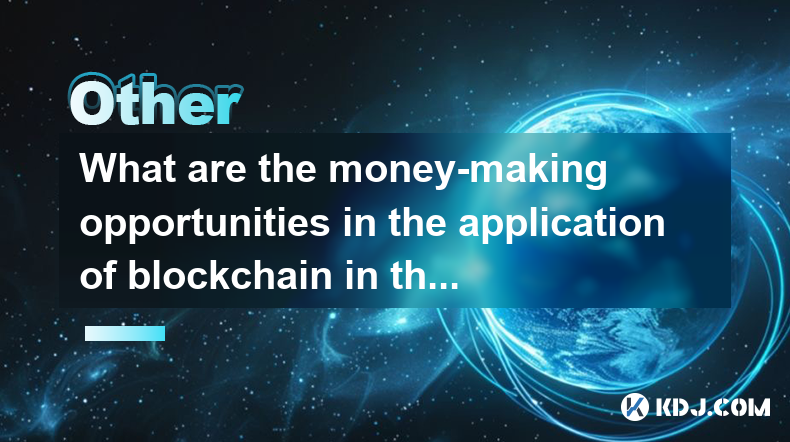
What are the money-making opportunities in the application of blockchain in the medical industry?
Apr 03,2025 at 03:35am
The integration of blockchain technology into the medical industry presents a myriad of money-making opportunities that can revolutionize healthcare systems. Blockchain's inherent characteristics, such as transparency, security, and immutability, make it an ideal solution for various medical applications. By leveraging blockchain, companies can develop ...
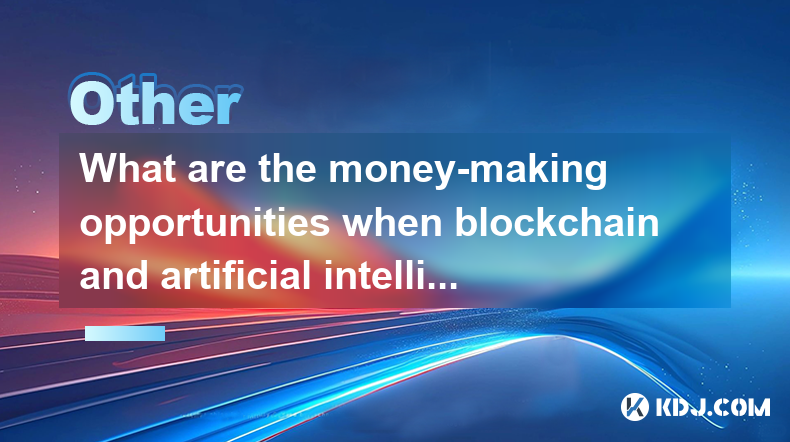
What are the money-making opportunities when blockchain and artificial intelligence are combined?
Apr 04,2025 at 01:28am
The convergence of blockchain and artificial intelligence (AI) presents a myriad of money-making opportunities within the cryptocurrency circle. This fusion leverages the decentralized and secure nature of blockchain with the analytical prowess of AI, creating innovative solutions and platforms that can generate significant revenue. From enhancing tradi...
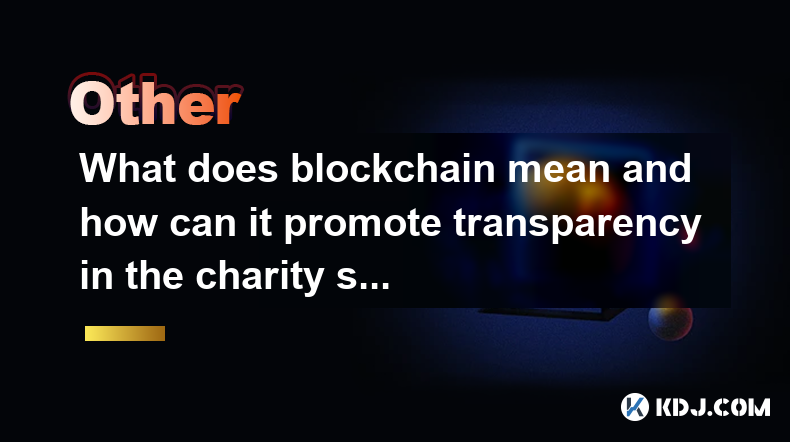
What does blockchain mean and how can it promote transparency in the charity sector?
Apr 03,2025 at 08:29pm
Blockchain technology is a decentralized, distributed ledger that records transactions across numerous computers. This ensures that the data is transparent and nearly impossible to alter retroactively. Essentially, blockchain serves as a digital ledger of all cryptocurrency transactions, enabling secure and direct exchanges without the need for intermed...
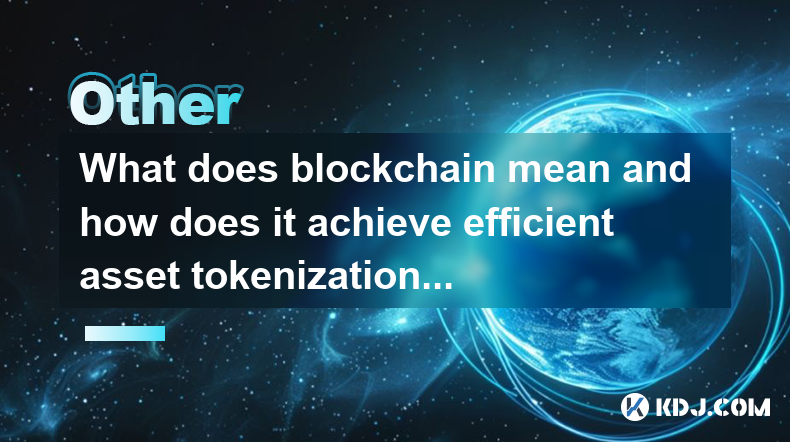
What does blockchain mean and how does it achieve efficient asset tokenization?
Apr 03,2025 at 07:57pm
Blockchain technology is a decentralized, distributed ledger that records transactions across numerous computers. It ensures that each transaction is secure, transparent, and immutable. The concept of blockchain was introduced with the launch of Bitcoin in 2009, but its applications have since expanded far beyond cryptocurrencies. At its core, blockchai...

What are the future development trends of blockchain game development?
Apr 03,2025 at 05:00am
Blockchain technology has revolutionized various industries, and gaming is no exception. As we look to the future, several trends are set to shape the development of blockchain games. These trends not only promise to enhance the gaming experience but also to integrate blockchain technology more seamlessly into the gaming ecosystem. Let's explore these t...

What are the maintenance costs of blockchain system development?
Apr 03,2025 at 06:07pm
The maintenance costs of blockchain system development are multifaceted and depend on various factors. These costs can include technical maintenance, security updates, infrastructure expenses, and personnel costs. Understanding these elements is crucial for anyone planning to develop or maintain a blockchain system. Technical MaintenanceTechnical mainte...

What are the money-making opportunities in the application of blockchain in the medical industry?
Apr 03,2025 at 03:35am
The integration of blockchain technology into the medical industry presents a myriad of money-making opportunities that can revolutionize healthcare systems. Blockchain's inherent characteristics, such as transparency, security, and immutability, make it an ideal solution for various medical applications. By leveraging blockchain, companies can develop ...

What are the money-making opportunities when blockchain and artificial intelligence are combined?
Apr 04,2025 at 01:28am
The convergence of blockchain and artificial intelligence (AI) presents a myriad of money-making opportunities within the cryptocurrency circle. This fusion leverages the decentralized and secure nature of blockchain with the analytical prowess of AI, creating innovative solutions and platforms that can generate significant revenue. From enhancing tradi...

What does blockchain mean and how can it promote transparency in the charity sector?
Apr 03,2025 at 08:29pm
Blockchain technology is a decentralized, distributed ledger that records transactions across numerous computers. This ensures that the data is transparent and nearly impossible to alter retroactively. Essentially, blockchain serves as a digital ledger of all cryptocurrency transactions, enabling secure and direct exchanges without the need for intermed...

What does blockchain mean and how does it achieve efficient asset tokenization?
Apr 03,2025 at 07:57pm
Blockchain technology is a decentralized, distributed ledger that records transactions across numerous computers. It ensures that each transaction is secure, transparent, and immutable. The concept of blockchain was introduced with the launch of Bitcoin in 2009, but its applications have since expanded far beyond cryptocurrencies. At its core, blockchai...
See all articles






















































































